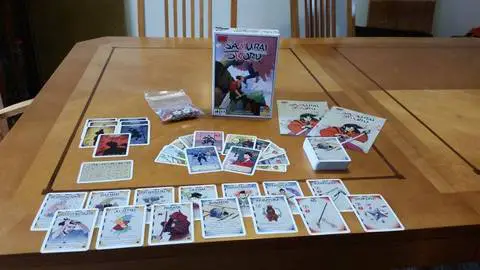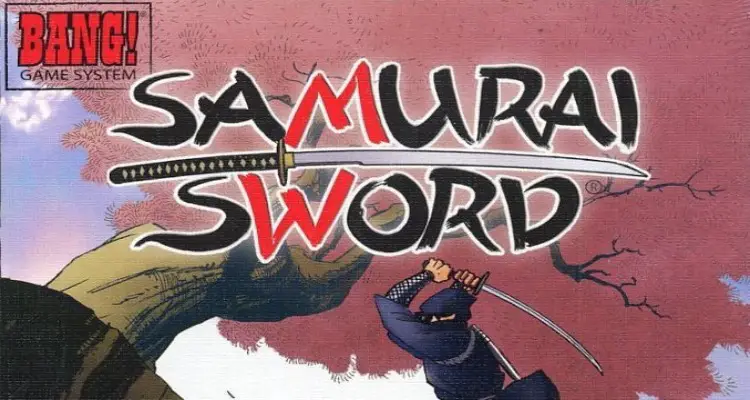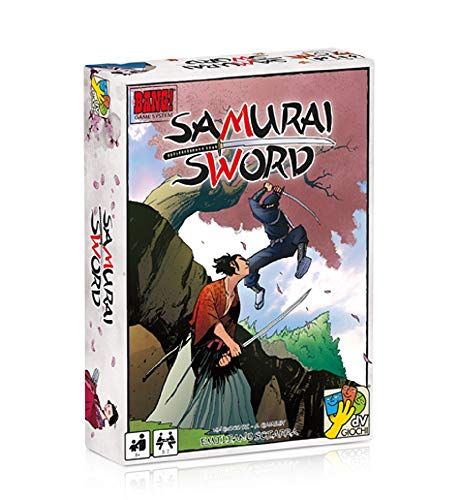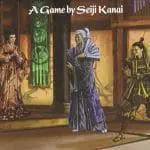At Dicey Goblin, we’re big fans of the original Bang! It’s a fun game for up to 7 people, and it [usually] plays pretty quick. So when I needed a new game for my birthday celebration, the Japanese-inspired variant of this Wild West-inspired card game seemed like the obvious choice. My friends and I are big fans of anime. Bang! Samurai Sword doesn’t disappoint, and in some ways it actually improves on daVinci’s original Bang!
Game Overview
Initial Thoughts of Bang! Samurai Sword

I love the artwork for Samurai Sword. There’s a very definite manga-type feel, as opposed to the very Old West theme in the original Bang! If you didn’t notice the Bang! logo on the corner of the box you probably wouldn’t even know it’s done by the same people….until you open the box.
Just as in the original, all of the cards have English and Italian on them and the rules are in both Italian and English. Personally, I would have loved to see Japanese on the cards to really sell the theme. The Italian definitely confused my friends who had never played any version of Bang! before, but we dubbed it a Ramen Western and went on with the game.
The character cards are based on historical figures (men and women), and the character’s special abilities are more or less the same as the original game. My favorite is Chiyome, who can only be wounded by weapons (making her immune to an entire class of cards). There are 12 characters total.
Samurai Sword is good for up to 7 players (though the Rising Sun expansion brings that up to 8) but I think it plays best with 5 players. The role breakdown is pretty simple:
- 1 Shogun (the Sheriff in the original game)
- 2 Samurai (the Deputies)
- 3 Ninjas (the Outlaws)
- 1 Ronin (the Renegade)
Essential, the game is a showdown. It’s the Shogun and Samurai vs. the Ninjas, with the Ronin aiming to be the last person standing.
Game Mechanics: Not New, Definitely Improved
Good: No more player elimination.
Bad: Honor points system can seem complicated.
I started my birthday game night with Sushi Go! because I thought it would be simpler than Bang! Samurai Sword. The opposite was true. They seemed to grasp the point of Samurai Sword quickly and just threw themselves into it.
The game uses the same mechanics as the original Bang!: Players attack each other using weapon cards, and other players can block them. Other cards give you more cards to play, special abilities, or allow you to mess with other players. Honestly, explaining the difference between types of cards is the most complicated part of the game for newbies.
There are a few key differences between this game and the original. The biggest difference is that there is no player elimination. Instead of a player being killed, he or she is just “Defeated,” and on the next turn they rejoin the game. And that means the damage system is a bit more complicated. In the original, when you sustain too many wounds you’re eliminated from the game. In Samurai Sword, you have so many Resilience Points (between 3 and 5). When you lose your resilience points, you are “Defeated” and you must give up an Honor Point. Every player has 4, except for the Shogun, who has 5. At the start of your next turn you regain all your resilience points.
In the original, you typically play until it’s just 2 players left. And then the game can drag on and on while they try to finish each other off. With Samurai Sword, the game ends when one player runs out of Honor Points. So the rest of your friends aren’t sitting around bored while two of you duke it out with no end in sight. The winner is whoever has the most honor points at the end. (Oh, and when you defeat a player, you take his or her honor point.)
A Few of My Favorite Things
I really like the way weapons design in this game. Each card has a range (between 1 and 5, so you can conceivably attack everyone even when playing 7 people) and does between 1 and 3 damage. It feels simpler than the original Bang!, where you have to select your weapon and play a Bang! card to attack.
I hate cards that make me lose a turn. (Probably because it almost always happens right as I’m about to do something that could turn the game in my favor.) So naturally I love the fact that Bang! Samurai Sword doesn’t have a card that forces players to skip a turn.
The game also events out the odds somewhat. It’s hard for the Renegade to win in the original because he or she has to eliminate everyone else, but in this one, honor points are multiplied by 2 or 3 depending on the number of players, so it’s easier for the Ronin to win, and the Shogun isn’t outnumbered by the Ninjas.
I’m not the best bluffer, but the table talk element of Samurai Sword is fun, especially if your friends, like mine, are agents of mayhem. (I’m not kidding; three of them are Loki cosplayers.) Good luck trying to figure out who everyone is.
What I Don’t Like
I’ve mentioned that explaining all the cards takes a bit of time, but it’s still very easy to learn. It just takes a bit longer to get the ball rolling.
The honor points system is a bit complicated, but it’s a price I’m happy to pay if it means no more player elimination. I think the terms for winning are probably the most difficult part to understand, since there’s a friendly-fire rule and the whole matter of scoring honor points.
Since the game mechanics are the same, there’s not much of a learning curve if you already know how the game plays. But even if you haven’t played, the rule book is easy to make your way through.
Overall Impression: You Won’t Regret Bang! Samurai Sword
I was already biased in favor of Bang! Samurai Sword, but it didn’t disappoint for me. My friends enjoyed playing it the first time around, and the second time, too. It’s not something that will alienate or overwhelm newcomers when everyone else already knows how to play.
It’s something we can add to our regular rotation, even with a bigger group. The fact that it’s team-based and the scores are evened out go a long way toward reducing the potential for sore losers, and ensures everyone can participate. It doesn’t feel like just a Japanese-themed copy of Bang!, but rather a true evolution of it.
So yes, this is one that’s worth adding to your collection. Dicey Goblin approves. =)






